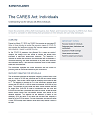COVID-19 Insights > CARES Act: Healthcare Industry, Education Funding and Banks
CARES Act: Healthcare Industry, Education Funding and Banks
Business Ownership
Passed on March 27, 2020, the CARES Act provides an estimated $2 trillion in fiscal stimulus to combat the economic impact of COVID-19 and provides the healthcare industry the financial support, equipment and protection it needs to combat the virus.
Below, review some of the major provisions in the CARES Act related to the healthcare industry, education funding and banks.
Healthcare funding
The act takes aim to combat the public health impact that could drain medical resources and have serious repercussions for medical institutions. Included are funds to help offset costs to hospitals and other providers. Other funds are dedicated to assist state and local response measures for detection, diagnostics, prevention and treatment of COVID-19, and provide for an increase to the national stockpile for drugs, protective equipment, medical supplies and additional funding for FEMA’s Disaster Relief Fund.
Medicare inclusions
Medicare usually pays 80% of the fee for services. Generally, the provider does not receive the full 80%, as Medicare has a fee that reduces the payments to providers by 2%, called the 2% sequestration. The CARES Act eliminates this 2% fee through the end of 2020. Medicare will also increase payments by 20% to the diagnosis-related group rate for patients with COVID-19 and eliminate Part B cost-sharing for COVID-19 testing and any future vaccines. It also allows states to offer COVID-19 testing and related services through Medicaid regardless of eligibility without cost-sharing. These changes allow needed funds for service providers and more access to testing for people without insurance.
Telehealth services
The act expands and encourages telehealth services by lessening the requirements to make these services available to more people during the emergency. It reauthorizes programs such as telehealth network and telehealth resource centers grants, several rural health grant programs, provides for modernization of the Public Health Service, and several health workforce development programs.
Other healthcare provisions
Included in the bill is a provision that prioritizes reviews of drug applications for drugs that may face a shortage.
Another allows the FDA to regulate certain non-prescription drugs that are marketed without an approved drug application. It reforms the regulatory process for OTC drug approvals, permitting the FDA more flexibility and providing incentives for pharmaceutical companies to research and manufacture innovative drugs.
Educational funding
As educational facilities have had to close to keep students and staff safe, $30 billion is allocated for instructional continuity. The act appropriates funds to institutions of higher education to prevent, prepare and respond to COVID-19. Funds may be used for lost revenue, technology costs associated with the transition to distance learning, and grants to students for food, housing, course material technology, healthcare and child care.
Bank provisions
As financial institutions are a vital part of the economy and an essential middleman to distribute funds to individuals and businesses, the bill provides a provision to reduce regulatory requirements on financial institutions to increase the speed and amount of funds into the hands of the people who need them.
Provisions include:
- Temporarily authorizing the Office of Comptroller of the Currency to exempt any transaction from its lending limits if the exemption is in the public’s best interest.
- Lowering the community bank capital ratio to lend out more and providing a reasonable grace period to get back to limits.
- Providing temporary relief for loan modifications for impacted borrowers to ease restructure debt without holding extra capital, which would otherwise be categorized as troubled debt restructuring (TDR).
- Adding non-bank financial companies to assist in distributing funds.
- Providing relief from current expected credit losses (CECLs) through December 31, 2020, or the termination of the current public health emergency, to delay financial institutions from measuring credit losses.
- Temporarily suspending the limitation on Exchange Stabilization Funds for guarantee program for the U.S. Money Market Fund industry.
- Providing a 100% guarantee on SBA 7(a) loans.
- Allowing the FDIC to guarantee bank accounts through the end of the year.
- Prohibiting foreclosures for 60 days, a moratorium on eviction filing for 120 days, and a one-year forbearance for borrowers who have federally backed mortgages who have experienced financial hardship due to COVID-19. Federally backed mortgages include those purchased or securitized by Fannie Mae or Freddie Mac; insured by the Federal Housing Administration, the U.S. Department of Veterans Affairs or the U.S. Department of Agriculture (USDA); and directly issued by USDA.
Your financial advisor and tax professional can provide more information about how the CARES Act affects you directly.
Read the full whitepaper: The CARES Act: Small Business
Please note, changes in tax laws may occur at any time and could have a substantial impact upon each person’s situation. While we are familiar with the tax provisions of the issues presented herein, Raymond James Financial Advisors are not qualified to render advice on tax or legal matters. You should discuss tax or legal matters with the appropriate professional.
Links are being provided for information purposes only. Raymond James is not affiliated with and does not endorse, authorize or sponsor any of the listed websites or their respective sponsors. Raymond James is not responsible for the content of any website or the collection or use of information regarding any website’s users and/or members. Raymond James does not provide tax or legal services. Please discuss these matters with the appropriate professional.

 Maggie Slivinski
Maggie Slivinski Steve Corbo
Steve Corbo Alexandra Rao
Alexandra Rao Alexa Comey
Alexa Comey Gene Donato
Gene Donato Jack W. Kennedy III, CFP®, AAMS®
Jack W. Kennedy III, CFP®, AAMS® Henry (Hank) J. Schroeder, CFP®
Henry (Hank) J. Schroeder, CFP® Diane Gallagher
Diane Gallagher Scott Bernstiel
Scott Bernstiel Chrissy Carpenter
Chrissy Carpenter David Strout
David Strout Keith R. Hering AAMS®, CRPS®, CIMA®
Keith R. Hering AAMS®, CRPS®, CIMA®  Marjorie Onuwa
Marjorie Onuwa